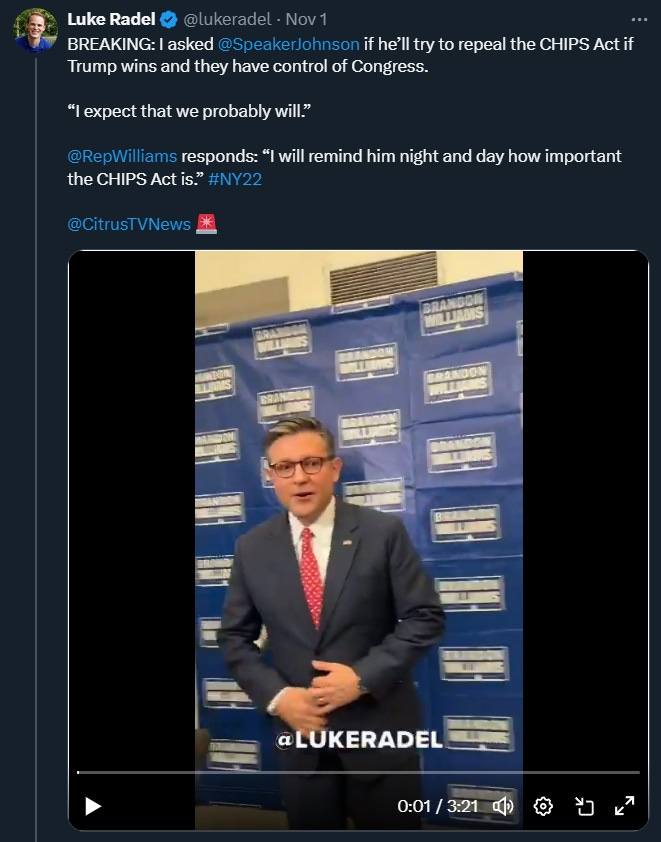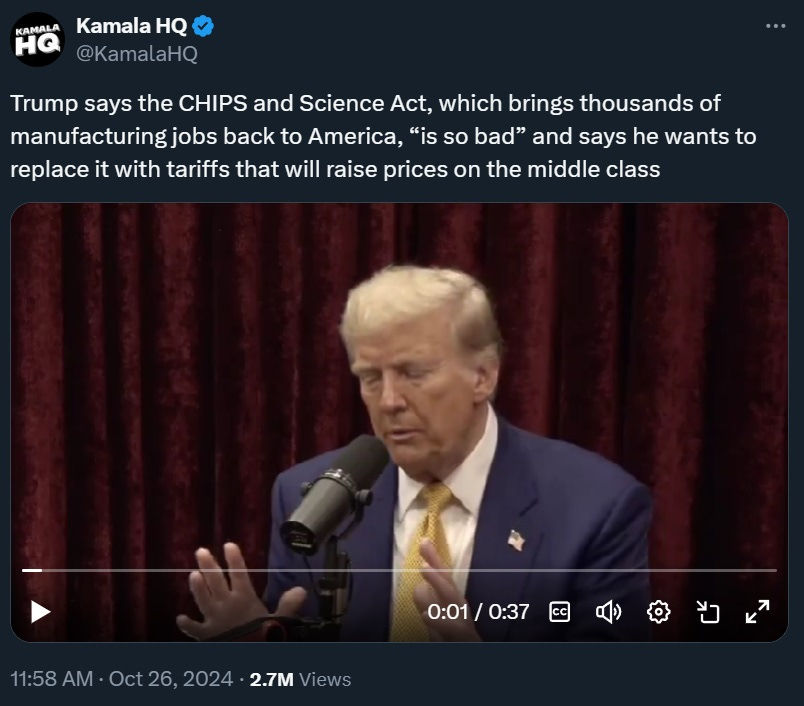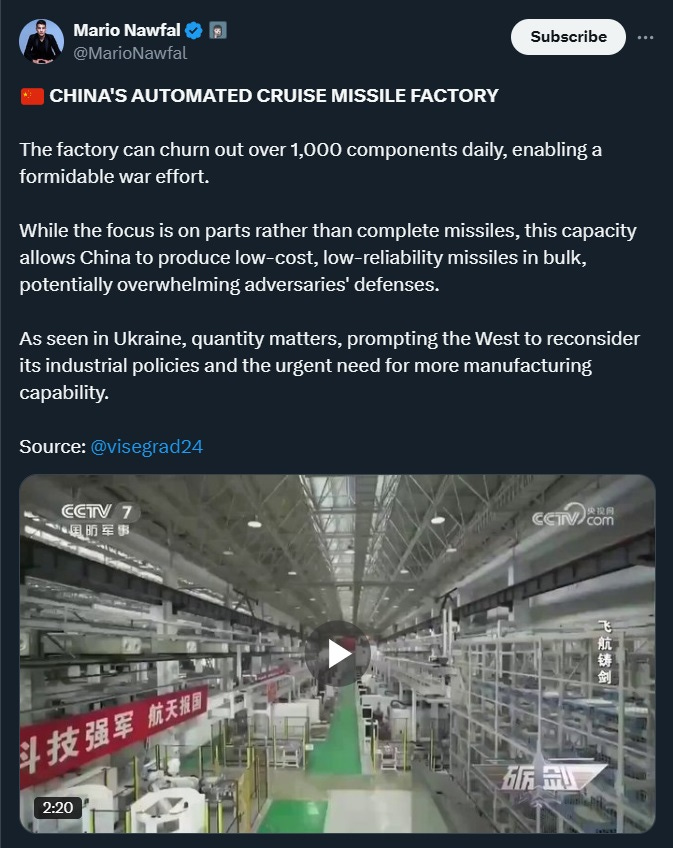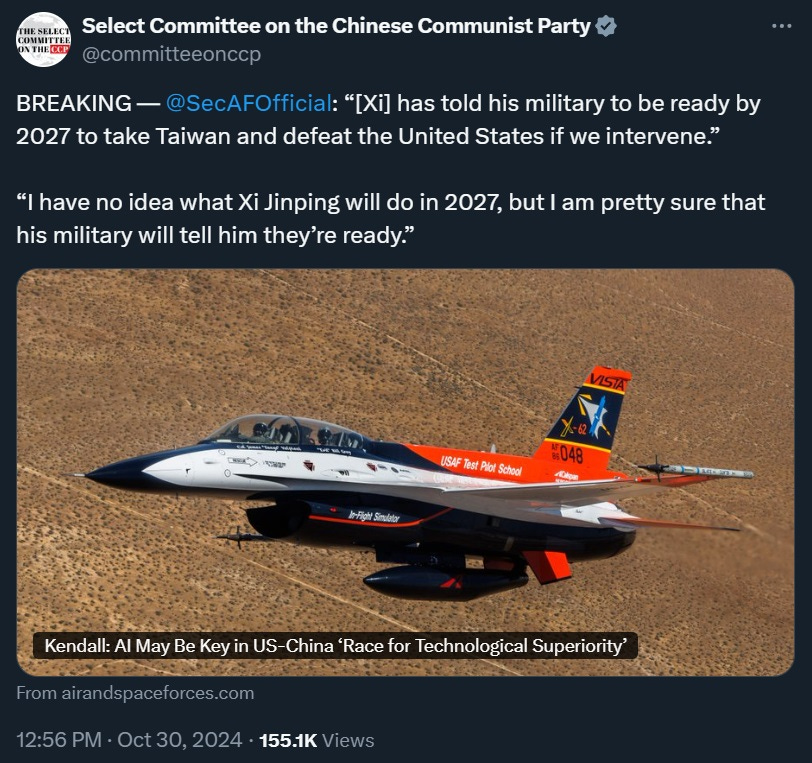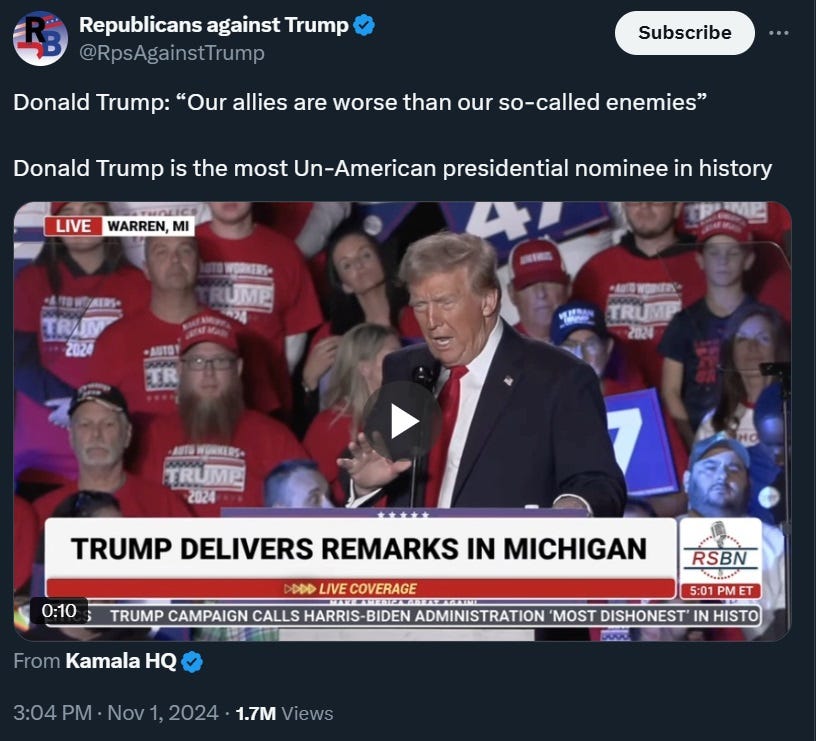Why on Earth does Trump want to cancel the CHIPS Act??
A second Trump presidency would truly be a gift to Xi Jinping.
I wasn’t planning to write another post about Trump and China. But then a student journalist named Luke Radel asked House Speaker Mike Johnson whether he and Trump will repeal the CHIPS Act if Trump wins the election, and Johnson said yes:
Johnson later appeared to walk back his answer, but Trump has already denounced the CHIPS Act, so it’s likely that Johnson — who generally does Trump’s bidding —was telling the truth:
My reaction to all this is: What on Earth?! Are you kidding me??
The CHIPS Act was a bipartisan bill, whose only purpose was to preserve or regain U.S. manufacturing capacity in the all-important semiconductor industry, in the face of a huge Chinese push for dominance of that industry. The bill has been successful so far, spurring private investment plans that dwarf the amount of government spending involved:
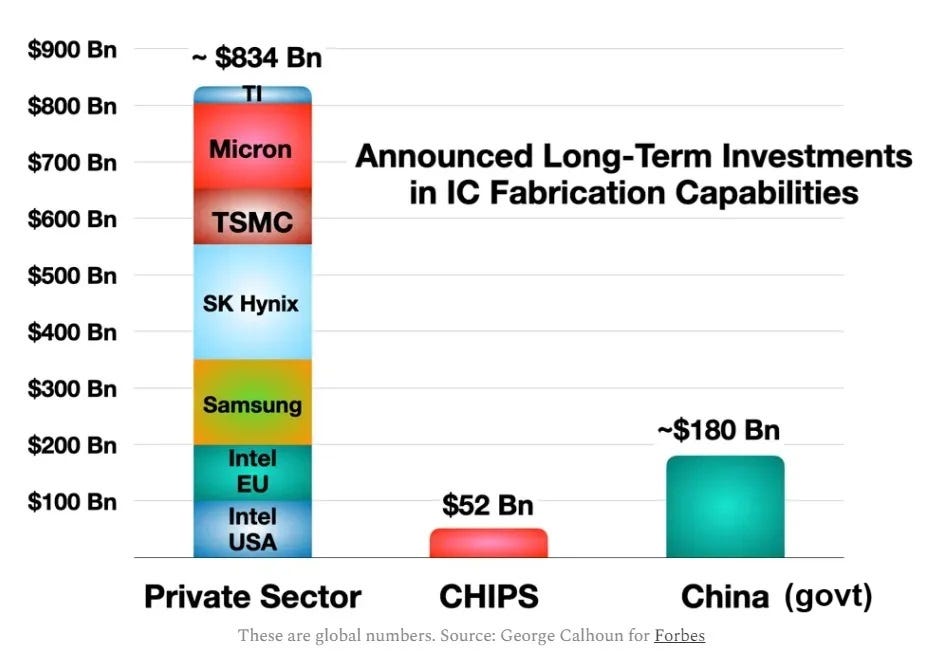
Initial fears that CHIPS Act projects would get bogged down in regulatory or labor disputes have proven unfounded so far. The TSMC fab in Arizona, probably the highest-profile project funded by the law, is now in operation and is achieving better quality than the company’s factories in Taiwan. Many American technologists immediatel hailed this news as a great victory for the U.S.A.:
It’s not just that one factory, though. Thanks to the CHIPS Act, the U.S. is expected to actually gain market share throughout the whole industry, after losing it steadily for many years:

And the bulk of these investments are going to red or purple states, with Arizona, Texas, Ohio, Kansas, and North Carolina among the beneficiaries:
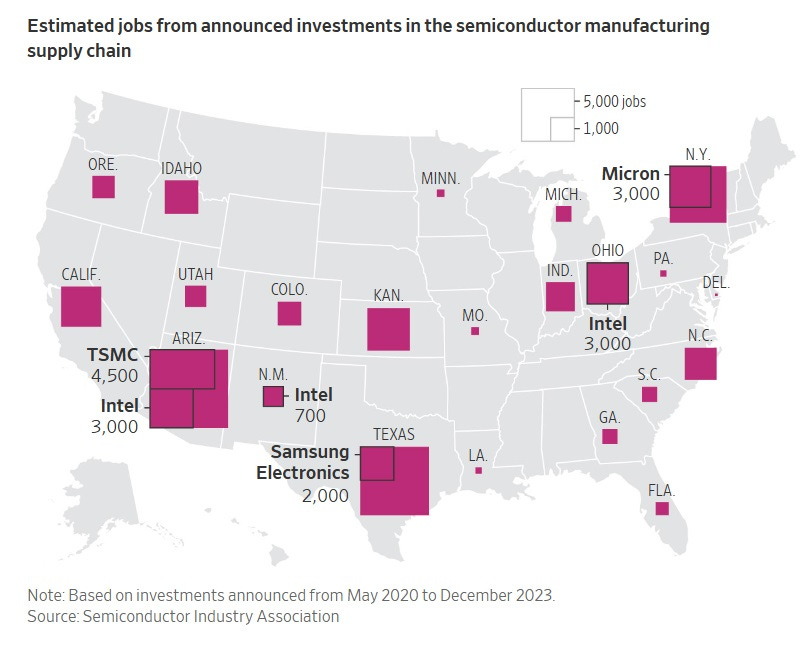
The manufacturing that the CHIPS Act is bringing back to America is helping out some of the same places that were hit hardest by the China Shock of the 2000s.
So to repeat: Why on Earth would Donald Trump and Mike Johnson cancel a bipartisan law that’s spurring hundreds of billions of dollars of private investment into a critical strategic manufacturing industry that’s mostly benefitting red states?
I do not know the answer to this question, but it can’t be good.
In my attempt to be as honest with my audience as possible, I always talk very openly about what my biggest concerns are. I’m mildly concerned about climate change; we’re making big progress against it, but we could go faster. I’m mildly concerned about U.S. unrest and institutional chaos; I think we’re on the path to national healing, but I think Trump would delay that process. I’m mildly worried about bioweapons, about government deficits, and about population aging.
But I am very worried about the People’s Republic of China.
In the early 20th century, the U.S. steered the destiny of the world for one simple reason: It could manufacture the most stuff. American production won World War 2, overwhelming the Axis countries. In the Cold War, the U.S. held a decisive manufacturing advantage over the Soviet Union, meaning that barring a nuclear exchange, the outcome of a contest between the communists and the free world was never in doubt.
But in the years since the turn of the century, this unassailable advantage vanished. In two short decades, China took the U.S.’ mantle as the workshop of the world, zoomed past us, and never looked back:

China’s manufacturing prowess inspires awe and dread. It is unprecedented and unrivaled in the history of the world. In just a few short years, China built a high-speed rail network bigger than the entire rest of the world combined:

Now imagine what that sort of manufacturing capability can do when turned to military purposes. Already China is building submarines at an incredible pace. And it has vast factories pumping out high-tech munitions:
Americans may comfort themselves with the knowledge that their missiles are slightly higher-tech (though that edge is fast eroding). But as the Ukraine war has vividly reminded us, modern high-intensity conflicts are rarely short and decisive — in general they drag on for a while, and use up far more ammunition than countries have on hand at the start of the war.
In other words, China’s awesome manufacturing prowess gives it escalation dominance over the U.S. Xi Jinping and his generals knows that in any war, even if China loses the initial engagements, if it just keeps fighting, America will run out of weapons quickly. That will give America two choices: Give up, or launch nukes and be nuked in return. And this confrontation could happen sooner rather than later:
If you’re not frightened of that, you should be.
The CHIPS Act isn’t enough to reverse this disparity in capabilities — not even close. But it’s an important first step. Chips are the essential input into all modern precision weapons, all planes, all ships, all tanks, all drones. They are essential for training and running AI. They are the most strategic industry of all, and currently, most of them are made by a small island just off the coast of China that China has sworn to conquer. That’s an incredible, gaping security vulnerability for the United States, and the CHIPS Act is an essential first step toward fixing it.
And now Trump wants to get rid of the CHIPS Act, and all industrial policy, and thus scuttle our best shot at putting up an effective defense against China.
The United States and its allies are currently in a new Cold War. This is not hypothetical; it is the present reality in which we live. And China is the principal opponent in that new Cold War. Not Russia, North Korea, or Iran — these are much smaller states with far weaker manufacturing capabilities, and without China they would be no threat to the U.S. With China, they are part of a New Axis that outmatches the U.S. alone, and would give the U.S. and all of its allies put together a run for its money.
If the U.S. loses this Cold War, the long-term results will probably be very bad for Americans. China’s leaders, knowing that the U.S. might one day rise to challenge them again, will do everything in their power to make sure this doesn’t happen. They will use their command of Eurasia to weaken the U.S. economically, and they will use every trick in the book to divide and weaken our society politically, all while building a military capable of cowing us militarily. The oceans will be no barrier. We will suffer the fate of the USSR after the first Cold War, except worse, because the People’s Republic of China is more vengeful and less generous than the United States.
Already, we can see the first glimmers of this strategy. China just put export controls on Skydio, the leading U.S. commercial drone company. Because China makes most of the world’s batteries, this may end up crippling a substantial portion of America’s drone manufacturing capacity.
And the U.S. may be poised to lose this new Cold War by default. Trump may unleash occasional bellicose rhetoric at China, or kick weakly at its economy with tariffs, but he has shown no appetite to build up U.S. industry to the point where it can actually defend against Chinese power. Biden did start to build up U.S. industry, and now Trump wants to cancel Biden’s efforts. Trump has also declared his opposition to the bipartisan TikTok divestment bill. Meanwhile, Trump constantly denigrates and threatens to pull out of U.S. alliances:
This is also a way of voluntarily forfeiting Cold War 2, since China is so big that without allies like Japan, Germany, South Korea, France, the UK, and hopefully India, the U.S. has no hope of matching it. If those allies fall and become satellite states of China and Russia, the U.S. will be isolated, alone, and utterly outmatched. Eurasia is simply much bigger and more powerful than North America; if you don’t believe me, just look at a map.
All this is not to say that Trump is some kind of Manchurian candidate, planted by China and Russia to weaken and destroy the United States. I obviously make no such claim.1 And yet it seems possible to predict almost everything he does vis-a-vis China and Russia simply by asking “What would China and Russia want him to do?”. Trump is simply the perfect stooge of hostile powers — someone so focused on fighting internal enemies that he refuses to do anything about external ones. Rush Doshi put it well in an recent op-ed:
The 2020s [will] be…the “decisive decade” in U.S. competition with China…The good news is that despite deep divisions in American politics, Democrats and Republicans now broadly agree on the need to outcompete China…
That united front will be undermined if Donald Trump is elected again. Ironically, although he helped catalyze the current bipartisan approach as president by upending the long-term U.S. policy toward China that emphasized engagement over competition, he has never fully embraced the new consensus and now stands outside it. On China, he is often at odds with his former staff members, current advisers, the nationalist wing of his party and even his own vice-presidential pick — all of whom see the challenge posed by Beijing more clearly than he does. Left to his own unpredictable impulses, Mr. Trump could very well lose this decisive decade for America…
China’s leaders…saw his term as an accelerant of…American decline…Mr. Trump focused on U.S. commodity exports instead of long-term manufacturing strength. He alienated allies and partners…On China policy, he routinely put personal gain over America’s interests and undermined important steps his staff members took to compete with Beijing…There is no reason to believe that in a second term Mr. Trump would deviate from the approach that weakened America’s position during his presidency.
It’s little wonder that China’s social media bot army has been strongly in favor of Trump this election cycle.
(Note that I’m not saying Kamala Harris would be perfect on China policy; I have a few worries there too. But I know she’ll be within the bipartisan consensus that China is a threat that needs to be stood up to. And I know she’ll have advisors who take this seriously, just as Biden did — in many cases, they’ll be the same people. So I’m far less worried about Harris than Trump.)
A second Trump presidency would be bad for many reasons. It would stress American society by prolonging the unrest of the 2010s. It would promote many of the country’s worst actors to positions of power and influence. But nothing Trump would do would be as dangerous as this. Forfeiting Cold War 2 by willfully destroying both America’s nascent manufacturing revival and its long-standing alliances would put the U.S. in greater danger than anything else he would do.
This is probably not the issue that’s foremost in the minds of most voters in this election. But it’s the thing that worries me the most.
The header image of this post notwithstanding.






